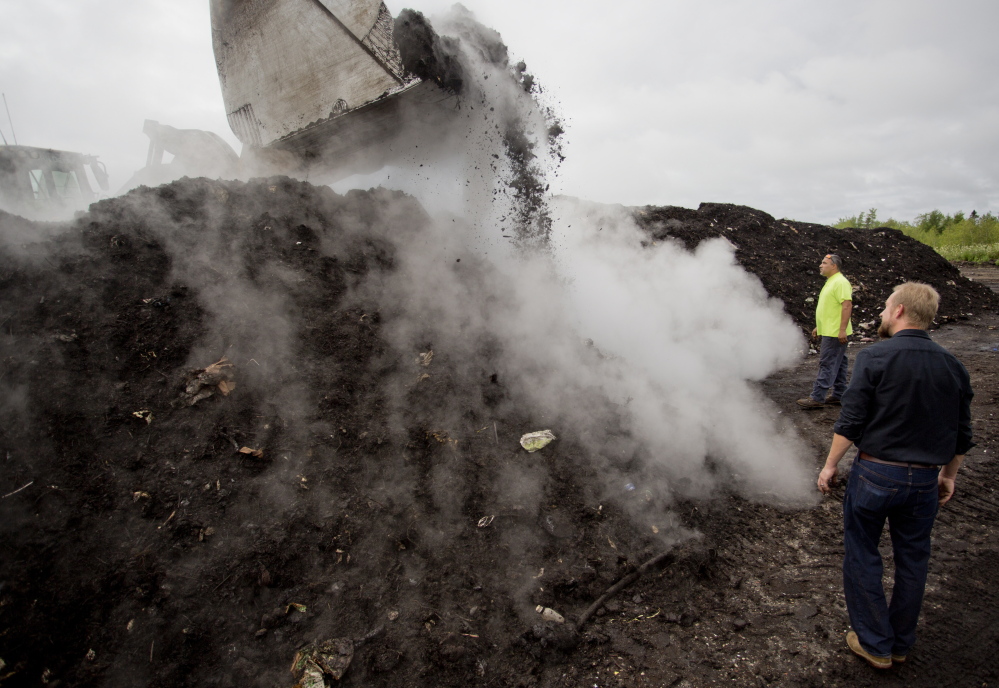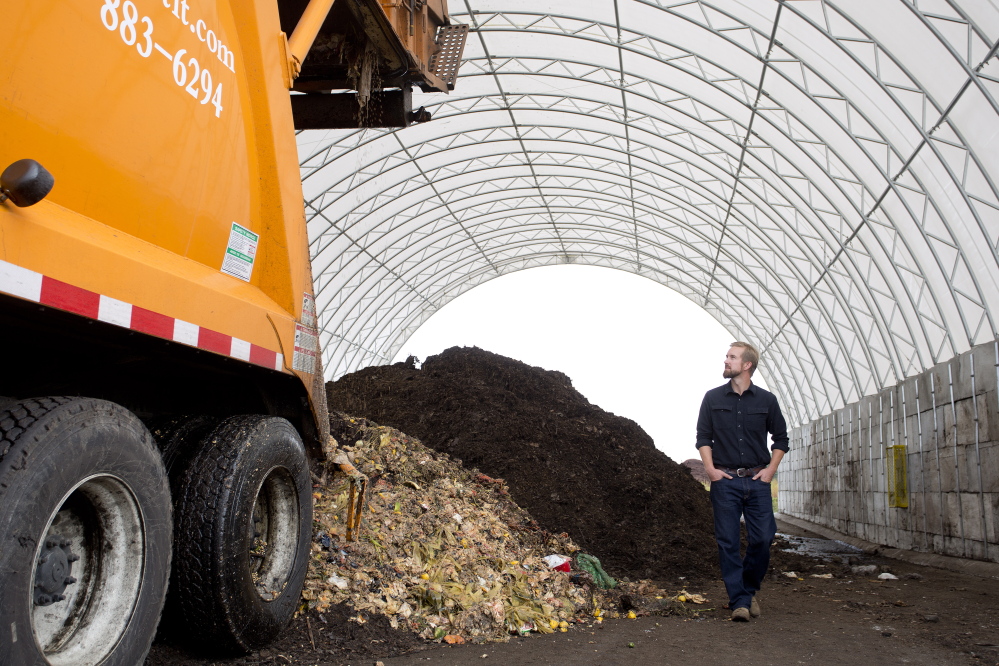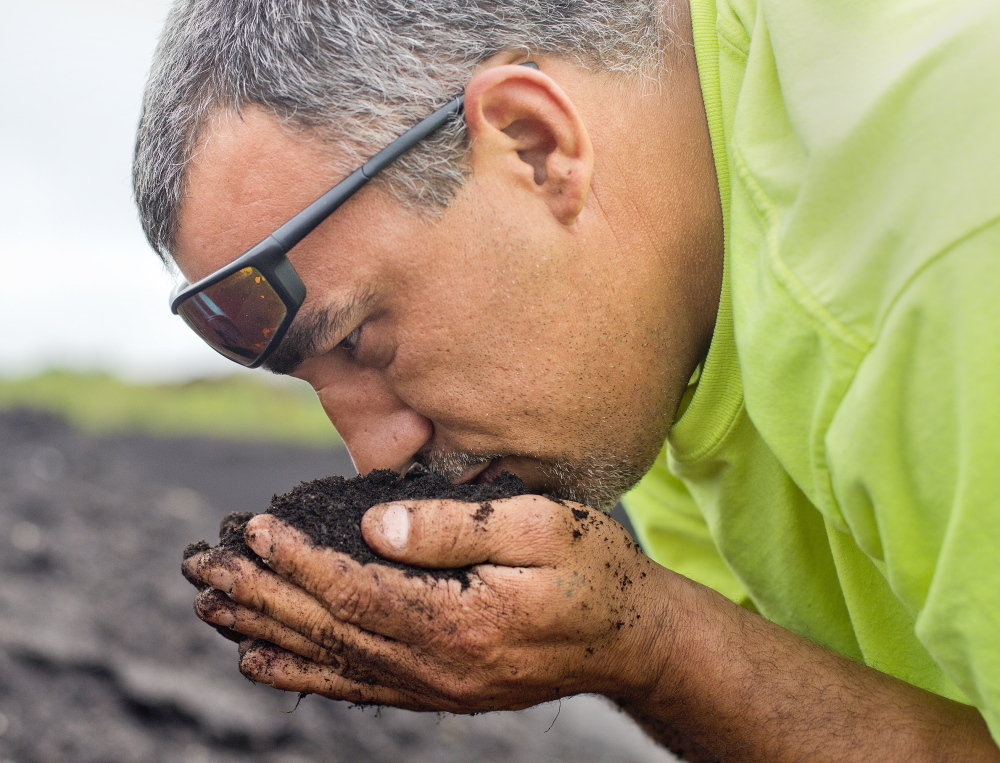AUBURN — Inside the steaming rows of piled-up compost at the We Compost It! operation in Auburn is your standard smorgasbord of commercial and institutional food waste: decomposing coffee grounds from the Hilltop Coffee Shop on Munjoy Hill; unfinished cafeteria food from Maine Medical Center; maybe some salsa that didn’t make the cut at Brunswick’s El Camino restaurant.
But also percolating within the piles – which cook at about 160 degrees thanks to the aerobic process of composting – are food scraps from households in Biddeford, Brunswick, Portland, South Portland and Topsham, where individuals have signed on for the subscription service, and one municipality, Kennebunk, which contracted with We Compost It! this year to provide curbside composting for residences.
Plenty of Maine supermarkets, corporate customers, schools and other institutions have already embraced composting. (The University of Maine even has an on-campus composting facility.) The next frontier is municipalities, not an easy nut to crack.
In a 2014 Colby College report on municipal waste in Maine, researchers called for improved composting in the state, noting that while residents composted at a higher rate than the United States as a whole, the average Mainer still generates and disposes of more than half a ton of waste annually.
One obstacle is the expense; many urban dwellers don’t want their towns using (or raising) their taxes to pay for yet another service, a service that some see as more the purview of rural dwellers who maybe turn over their compost heaps in between milking cows. Others don’t want to live next to a giant compost heap run by their public works departments.
But contractors like We Compost It! are making steady inroads into the business of municipal composting, with compromises.
Here’s the way it works in Kennebunk. The city does outreach for We Compost It! but the service, which is not mandatory, is paid for by individuals. There are about 200 subscribers for the monthly service so far or just under 2 percent of Kennebunk’s population. In return, the residents get a slight price break (they pay $8.26 to We Compost It! monthly, whereas Portland subscribers have been paying $9.50) and are entitled to 5 pounds of compost every week.
After crossing the threshold of 500 residential participants in Maine this month, We Compost It! announced it is dropping the price of monthly subscriptions in uncontracted communities like Brunswick from $11.50 to $8.99.
Meanwhile, a second composting company, Garbage to Garden, is servicing residential customers in eight cities (there is some overlap) and there is interest from other communities. Garbage to Garden’s website invites residents from 12 other municipalities under consideration for expansion to indicate their interest with an online signature (Gorham, with 231 signatories at press time, wants it the most). So there’s competition over food waste, or as those in the waste industry call it, organics. (Not to be confused with organic foods, the term in this case refers to waste that can be composted, which is essentially anything that was once living, including paper products.)
“It’s just an idea whose time has come,” said Brett Richardson, the general manager of We Compost It! and one of its founders. Formerly called Resurgam, the service sprang from a student project Richardson worked on at the University of Southern Maine’s Muskie School of Public Policy.
He and Leo Amaral, the operations manager of CPRC Group, a debris recycler that We Compost It! partners with at the Auburn site, were standing at the end of a line of piles (known by the agricultural term windrows) of curing compost. The windrows already looked like black gold. The company’s orange truck had delivered a fresh load of waste that morning and would be back again in a few days.
“I’m getting crowded here,” Amaral observed. Not crowded enough for Richardson.
“My plan is to break him,” Richardson joked.
VINTAGE CHICKEN
If that sounds at all puzzling to you, consider this. Americans waste a lot of food, and estimates are that only 4 percent of food waste that could be composted is. According to the findings of a 2011 waste composition study by the University of Maine, 38.41 percent of what Mainers disposed of could have been composted. And that food waste is smelly, wet and harder to incinerate. Or break down in a landfill.
When ecomaine, the municipally owned waste services operator that represents 54 member communities from Portland to Waterville and even into New Hampshire, dug down through layers upon layers of garbage in a landfill recently, eventually getting to a section filled 25 years earlier, they encountered things no one would want to see.
“We found chicken breasts that were still identifiable as chicken breasts,” said Kevin Roche, CEO of ecomaine. “We found newspapers that were 25 years old and the stories were still readable.”
Better to have let them rot in a much more useful way.
“We believe there is a better strategy for the organic component of the waste stream,” Roche said. And he said ecomaine, which sponsored a major feasiblity study on composting in Maine in 2013, will be part of the strategy. “I don’t know if we will do it ourselves or if we will hire someone or contract out. But what we are seeing already is there is enough interest from the public and businesses that this is already starting to happen.”
But he, like others, cautions that wide-scale municipal composting is in its infancy. While cities like San Francisco and Seattle have made composting mandatory (and New York has considered it), we’re a long way from mandatory composting in Maine. Nothing happens overnight.
“There is no such thing in this business as a quick fix,” Roche said. “I believe this is in our future. Twenty-five years ago we were at this juncture in recycling.”
A juncture that included a lot of naysaying and doubt. “I remember getting feedback that people aren’t going to participate in your blue bin business,” he added. “And here we are, 25 years later and participation in our recycling programs is very strong.”
Roche is hopeful that in another 20 years we’ll hardly remember when we didn’t compost.
THE ICK FACTOR
It its 2014 report, Colby called for an “integrated statewide or numerous regional composting framework” to improve composting rates. Roche agrees. “To really drive it forward there has to be a more comprehensive approach,” he said.
Composting is simple when it happens in a backyard; food waste and lawn clippings, leaves and the like, “cook” in the pile and break down into the kind of amendment that makes next year’s tomato crop that much sweeter.
But it does have limitations. For instance, not enough heat is generated in the average backyard pile to process that old chicken breast. Lobster bodies and bread, yes, but not meat or bones. That can be handled on a large scale, but it involves retraining consumers to sort out their smelliest, dirtiest garbage, put it on the curb in a container that doesn’t invite say, every raccoon around, and then getting the container back to the consumer clean and ready for more.
“We call it the ick factor,” Roche said. “And the ick factor has to be solved. You have to have a program that is going to satisfy the customer.”
But nibbling away at it, as municipalities are now, is akin to how recycling first took off. Of the 96 compost facilities licensed by the Maine Department of Environmental Protection, 37 are municipal projects. Most of these handle just green waste (leaves, grass clippings and the like) although some, like Yarmouth’s and Freeport’s, accept dropped-off food waste as well.
What happens after the drop-off varies. The town of Freeport provides a bin at the transfer station for residents to bring their food waste and We Compost It! picks it up.
In Yarmouth, the town invited residents to bring food waste to add to its green waste. As long as the amounts stay proportionately small, the facility can handle some “browns” with its greens. Efforts to promote that option to residents who don’t compost at home have included giving away free bins.
The program started small – just four yards of food waste got mixed into the approximately 3,500 yards of green waste the first year – but in 2014, residents contributed 75 yards of food waste.
Erik Street, Yarmouth’s public works director, thinks those numbers will continue to increase, but he’s cautious about getting too big. “If it is not done properly, you can have quite an odor and a vector problem,” he said. Vector is a tidy way of saying rodents and insects that may carry disease. The other question he has is capitalism 101, and the one that makes him happy to be operating on a small scale in Yarmouth. “We use our compost and we make it free to residents. I am not trying to sell it or make a profit off it.”
Richardson doesn’t mind selling the service. Or being in competition with Garbage to Garden ($14 a month for individuals, although volunteer hours can be exchanged for the service) for other city contracts like the one in Kennebunk. They’re likely to come up for bid.
Troy Moon, environmental program manager for Portland Public Works, said the city is looking broadly at its entire waste system in the coming months. “Is it time to make some changes?” he said. Probably.
Preliminary findings of a University of Southern Maine waste composition study (translation: what’s in the garbage?) found that Portlanders’ trash contains 37.42 percent compostable materials, the bulk of which, 33 percent, is food waste. That costs the city approximately $208,000 a year in tipping fees at the incinerator.
Will Portland go into the composting business itself? Unlikely, Moon said.
“It would be difficult to have a facility that could handle the entire city,” Moon said. But contracting it out? “There is a lot of capability in the private sector now,” he added.
And more coming. “I think eventually we’ll get beyond the original players,” Richardson said. That won’t bother him either; other players vying for Maine’s food waste should drive prices down.
“And then people who want to do the right thing but can’t afford to, will be able to,” he said.
Send questions/comments to the editors.





